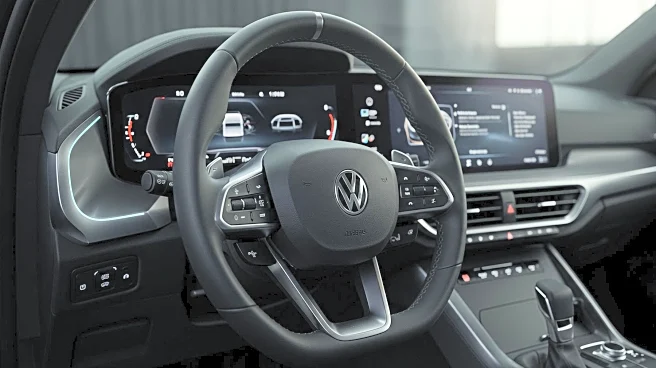What's Happening?
Volkswagen Group of America is facing a class-action lawsuit concerning the capacitive touch buttons in the steering wheels of its 2021-2023 ID.4 models. The lawsuit, filed in New Jersey by two vehicle owners, claims that these buttons are overly sensitive, leading to unintended activation of the adaptive cruise control. This has resulted in accidents, including one where a vehicle accelerated unexpectedly, causing significant damage and injury. The lawsuit includes numerous complaints from other ID.4 owners, reported to the National Highway Traffic Safety Administration, highlighting issues such as unintended acceleration and emergency braking failures. Volkswagen has acknowledged the complaints and plans to discontinue the technology in future models.
Why It's Important?
The lawsuit against Volkswagen highlights growing consumer dissatisfaction with modern automotive technology, particularly touch controls. This case could influence industry standards and consumer expectations, potentially leading to a shift back to traditional controls. If successful, the lawsuit may result in financial repercussions for Volkswagen and prompt other automakers to reassess their technology strategies. The outcome could also impact consumer trust and brand reputation, affecting sales and market dynamics in the automotive industry.
What's Next?
Volkswagen may face increased scrutiny from regulatory bodies and consumer advocacy groups. The company might need to address the existing vehicles on the road with the problematic technology, possibly through recalls or software updates. The legal proceedings could set a precedent for similar cases, encouraging more consumers to challenge automotive technology issues. Stakeholders, including other automakers, will likely monitor the case closely to gauge potential impacts on their own product designs and consumer relations.
Beyond the Headlines
The lawsuit raises questions about the balance between innovation and user safety in automotive design. It underscores the ethical responsibility of automakers to ensure new technologies do not compromise driver safety. The case may lead to broader discussions on the role of consumer feedback in shaping technological advancements and the importance of rigorous testing before implementation.









